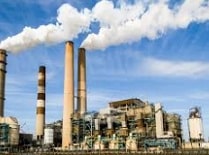The first thing we are going to do before delving into the meaning of the term industrialization is to discover its etymological origin. In this case, we can state that it is a word that derives from Latin. Exactly it is the result of the sum of several lexical components of said language:
-The noun "industrialis", which is used to refer to the set of materials and operations that are carried out to carry out something.
-The «-izare» component, which is synonymous with «convert into».
-The suffix "-cion", which is used to indicate "action and effect."
Industrialization is the process and result of industrializing . This verb (industrialize), for its part, refers to ensuring that something is produced at an industrial level or to granting preponderance to the industry in the economy of a nation.
 Before moving forward, therefore, we must focus on the idea of industry. This is the name given to those operations that allow products to be obtained, transformed or transported. The concept also refers to the factory or plant that is dedicated to these activities and to the sum of the industries of a genre, a region or a country.
Before moving forward, therefore, we must focus on the idea of industry. This is the name given to those operations that allow products to be obtained, transformed or transported. The concept also refers to the factory or plant that is dedicated to these activities and to the sum of the industries of a genre, a region or a country.
Returning to the notion of industrialization, the term is usually used to refer to large-scale production . For there to be industrialization in this sense, there must be machinery that makes these types of actions possible.
As an economic process, industrialization generates greater wealth than artisanal or small-scale production. That is why the most powerful countries are those that are industrialized: they buy raw materials at low cost and sell industrial products with added value.
At a general level, industrialization arose with the advancement of technology and science. Little by little, human beings moved away from rural activities to take on industrial tasks, an evolution that generated social changes of enormous importance and that favored the development of capitalism .
Among the main advantages that industrialization brings with it, we can highlight the following:
-Greater productivity is achieved in an area and, therefore, its economy is significantly increased.
-Commit to improving resource management.
-Manages to create new jobs.
-A notable reduction in time is achieved in the manufacturing of any product.
-Quality levels are optimized.
-Greater competitiveness is achieved at the business level.
However, we cannot ignore the fact that industrialization also brings with it its disadvantages. We are referring to the following:
-Higher investment costs are required.
-There is a contribution to greater social inequalities among the population.
-It is necessary to invest time and money in the training and training of professionals.
-It can lead to damage to the environment and increase pollution in an area.
-A notable dependence on technology and machinery is established.
The Industrial Revolution is the name given to the first major industrialization process that occurred in the world. This transformation began in the last decades of the 18th century in England and then spread to other countries on the European continent and to the United States , reaching its end before the middle of the 19th century .
